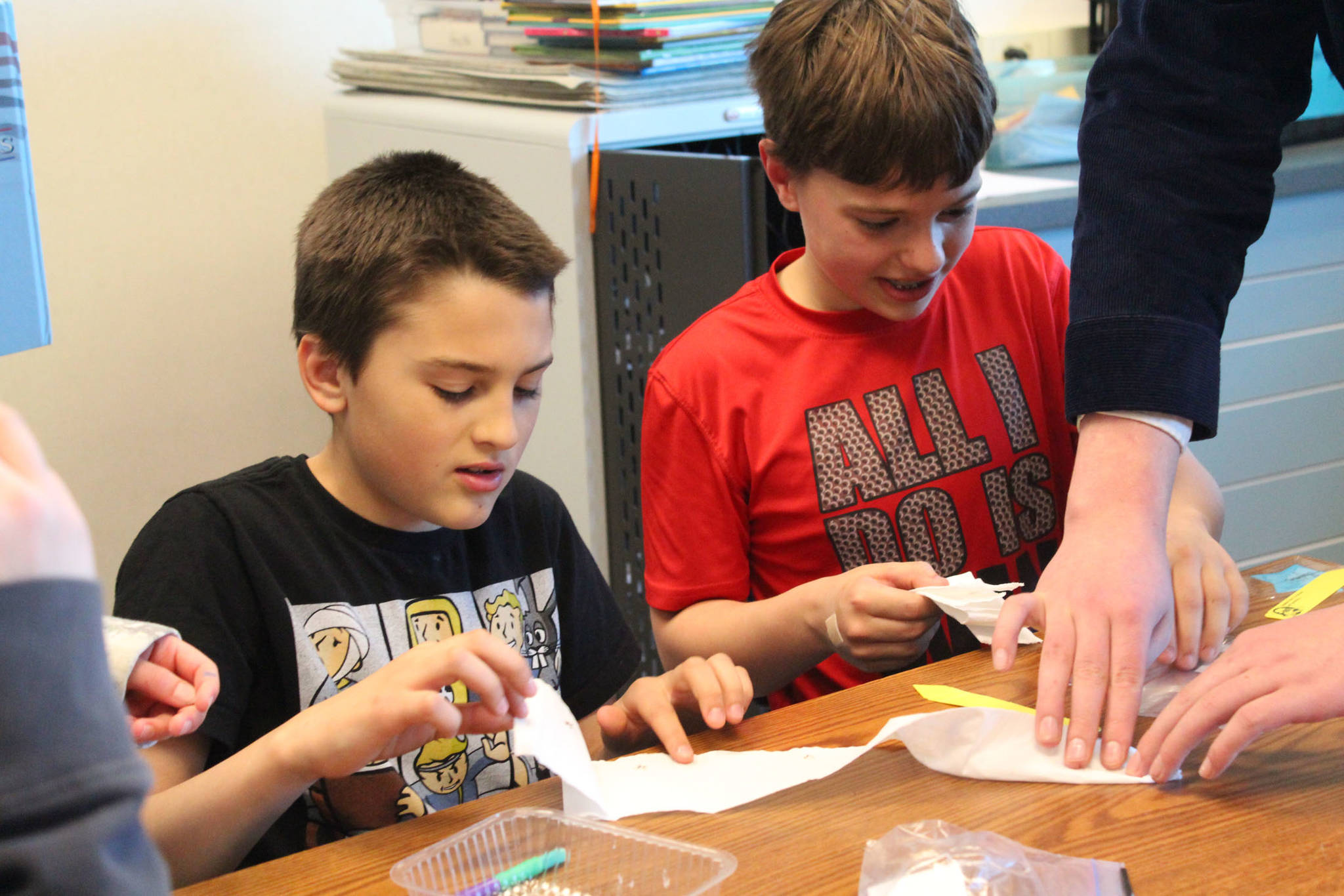When Jodie Kain, president of the National FFA Organization’s Ninilchik chapter, asked how many students in a room at Ninilchik School came from families that farmed or planted, about 90 percent of the little hands shot into the air.
This was a good sign, as the class of fourth, fifth and sixth graders were about to partake in an exercise that involved making seed tapes, or strips of material with pre-organized seeds that make planting more precise. In honor of Alaska Agricultural Day on Tuesday, Kain and two other members of the local FFA chapter brought an educational program into the school for the first time since they formed the chapter. They presented a modified version of the activity to younger students earlier in the day.
“We’re really excited to finally get into the school and … educate children, and so we thought Alaska Agriculture Day was the perfect opportunity,” Kain said.
Formerly known as Future Farmers of America, the National FFA Organization is a nonprofit that promotes farming, agriculture and career training for young people. Students can join the Ninilchik chapter, which was only formed a few years ago, as early as middle school.
Kain said she and the chapter’s other representatives, senior Robert McGinnis and sophomore Jacob Clark, wanted the students on Tuesday to take away that “Alaska agriculture is in their daily lives. You know, they can grow things, they might have a garden at home, they might have animals. Just to kind of show them the importance of growing agriculture right here and Alaska.”
11-year-old Jade Jackinsky knows a thing or two about planting, though she said she hadn’t made a seed tape before Tuesday. Her parents helped start Ninilchik’s community garden, and she’s been helping out there ever since. Her family plants and harvests several products, including about 5,000 pounds of potatoes a year, Jackinsky said.
“Our land has a lot of history in it,” she said. “It’s important because there aren’t many people left in the world that are really focused on gardening and not always going to the store and relying on the store.”
Jackinsky said it’s important to not rely solely on stores in case they were ever shut down or the food supply was cut off. She also noted the difference between home grown foods and those bought at the grocery store.
“It’s a lot tastier,” she said. “It’s just more home grown. You can taste the difference.”
Jackinsky said she anticipates her dad will be pleased she learned how to make a seed tape.
Similar sentiments were echoed by 10-year-old Kannon Hughes and 12-year-old Ceiony Allen, who also come from families that plant or garden. Hughes said he and his family grow cabbage, carrots and radishes, to name a few. He said gardening and growing food is important so you have things to eat readily at hand.
Allen said his grandparents especially are big on planting.
“It’s like a jungle in my house,” he said.
In addition to enjoying the fruits of his family’s labor, Allen said he enjoys planting things himself, mostly because it means playing in the dirt and the anticipation of getting to eat what he’s grown.
“Usually when you buy stuff from stores it’s … not as good,” Allen said. “It’s not as fresh.”
Students used strips of toilet paper as their seed tapes, carefully placing the seeds in spaced out intervals along the strips by dabbing them on with paintbrushes and a flour mixture. When they bring the seed tapes home, students will be prepared with directions on how to plant them, and will be yielded carrots by October, Kain said.
The Ninilchik FFA chapter currently has nine members. Some upcoming goals for the group this year include volunteering at the community garden and helping to send Kain to the National FFA Convention and Expo, according to chapter advisor Katie Matthews.
The national convention will feature seminars and workshops, as well as a competition, and will be attended by some 60,000 people in the agriculture sector. Kain has placed first in Alaska for the employability skills competition.
Speaking of FAA, Kain said she had grown up with horses and other animals, but didn’t have much experience with gardening or growing. The same was true of McGinnis, who had the least experience before getting involved with the chapter. A big fan of volunteering in the community, McGinnis said he saw FFA as another great way to get out and give back.
Clark, who comes from a farming family, said he was inspired to join the chapter when he saw his younger sister participating. He said planting is always a good life skill to have.
Kain and Matthews emphasized the importance of nurturing self sufficiency when it comes to agriculture, especially in a state like Alaska where the majority of produce is imported.
“Some communities are not even on the road system, so they get an airplane once a week, and then it’s hard to pay $28 for a gallon of milk or two apples,” Matthews said. “So if you can grow the majority of your own food, or barter for your food, then you’re … more independent.”
For more information, visit the Ninilchik FFA chapter’s Facebook page, or email them at ninilchikffa@gmail.com.
Reach Megan Pacer at mpacer@homernews.com.


